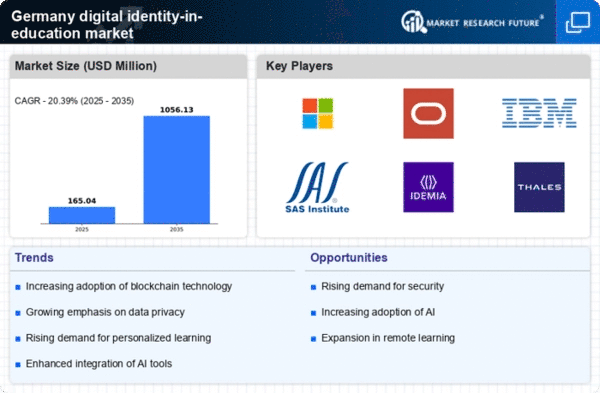Rising Demand for Secure Access
The digital identity-in-education market is experiencing a notable increase in demand for secure access solutions. Educational institutions in Germany are prioritizing the protection of sensitive student data, which has led to a surge in the implementation of robust identity verification systems. According to recent statistics, approximately 70% of educational organizations are investing in advanced security measures to safeguard personal information. This trend is driven by the need to comply with stringent data protection regulations, such as the General Data Protection Regulation (GDPR). As a result, The digital identity-in-education market is expected to expand as institutions seek reliable solutions that ensure secure access to educational resources.
Government Initiatives and Funding
Government initiatives play a crucial role in shaping the digital identity-in-education market. In Germany, various funding programs are being introduced to support the development and implementation of digital identity solutions in educational settings. For instance, the Federal Ministry of Education and Research has allocated €100 million to enhance digital infrastructure in schools, which includes identity management systems. This financial backing encourages educational institutions to adopt innovative technologies that streamline identity verification processes. Consequently, the digital identity-in-education market is poised for growth as government support fosters an environment conducive to technological advancement.
Increased Online Learning Platforms
The proliferation of online learning platforms is significantly influencing the digital identity-in-education market. With the rise of e-learning, educational institutions in Germany are increasingly adopting digital identity solutions to manage user access and ensure the integrity of online assessments. Reports indicate that the online education sector is projected to grow by 15% annually, necessitating effective identity management systems. This growth creates a demand for secure and efficient identity verification processes, thereby driving the digital identity-in-education market forward. Institutions are likely to invest in technologies that facilitate seamless access to online resources while maintaining stringent security protocols.
Growing Awareness of Cybersecurity Threats
As cybersecurity threats become more prevalent, awareness among educational institutions in Germany is rising. The digital identity-in-education market is responding to this heightened concern by offering solutions that address potential vulnerabilities. Recent surveys indicate that over 60% of educational leaders recognize the importance of implementing comprehensive identity management systems to mitigate risks associated with data breaches. This awareness is likely to propel investments in advanced identity verification technologies, as institutions seek to protect their digital assets and maintain the trust of students and parents. The digital identity-in-education market is thus expected to benefit from this growing emphasis on cybersecurity.
Technological Advancements in Identity Solutions
Technological advancements are reshaping the landscape of the digital identity-in-education market. Innovations such as biometric authentication and multi-factor authentication are gaining traction among educational institutions in Germany. These technologies enhance the security and efficiency of identity verification processes, making them increasingly attractive to schools and universities. Data suggests that the adoption of biometric solutions could increase by 25% in the next few years, driven by the need for more secure access methods. As educational institutions embrace these advancements, the digital identity-in-education market is likely to witness substantial growth, reflecting the ongoing evolution of identity management technologies.
















